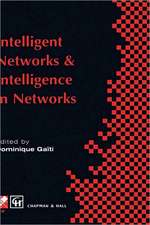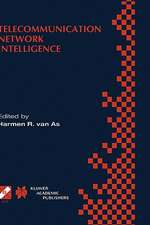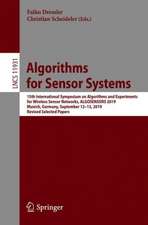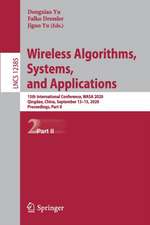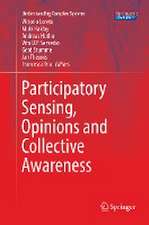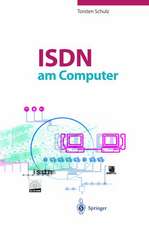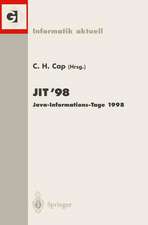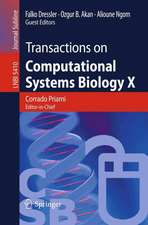Self-Organizing Systems: 7th IFIP TC6 International Workshop, IWSOS 2013, Palma de Mallorca, Spain, May 9-10, 2013, Revised Selected Papers: Lecture Notes in Computer Science, cartea 8221
Editat de Wilfried Elmenreich, Falko Dressler, Vittorio Loretoen Limba Engleză Paperback – 5 feb 2014
Din seria Lecture Notes in Computer Science
- 20%
 Preț: 1061.55 lei
Preț: 1061.55 lei - 20%
 Preț: 307.71 lei
Preț: 307.71 lei - 20%
 Preț: 438.69 lei
Preț: 438.69 lei - 20%
 Preț: 645.28 lei
Preț: 645.28 lei -
 Preț: 410.88 lei
Preț: 410.88 lei - 15%
 Preț: 580.46 lei
Preț: 580.46 lei - 17%
 Preț: 427.22 lei
Preț: 427.22 lei - 20%
 Preț: 596.46 lei
Preț: 596.46 lei -
 Preț: 449.57 lei
Preț: 449.57 lei - 20%
 Preț: 353.50 lei
Preț: 353.50 lei - 20%
 Preț: 1414.79 lei
Preț: 1414.79 lei - 20%
 Preț: 309.90 lei
Preț: 309.90 lei - 20%
 Preț: 583.40 lei
Preț: 583.40 lei - 20%
 Preț: 1075.26 lei
Preț: 1075.26 lei - 20%
 Preț: 310.26 lei
Preț: 310.26 lei - 20%
 Preț: 655.02 lei
Preț: 655.02 lei - 20%
 Preț: 580.93 lei
Preț: 580.93 lei - 20%
 Preț: 340.32 lei
Preț: 340.32 lei - 18%
 Preț: 938.83 lei
Preț: 938.83 lei - 20%
 Preț: 591.51 lei
Preț: 591.51 lei - 15%
 Preț: 438.59 lei
Preț: 438.59 lei - 20%
 Preț: 337.00 lei
Preț: 337.00 lei -
 Preț: 389.48 lei
Preț: 389.48 lei - 20%
 Preț: 607.39 lei
Preț: 607.39 lei - 20%
 Preț: 1024.44 lei
Preț: 1024.44 lei - 20%
 Preț: 579.30 lei
Preț: 579.30 lei - 20%
 Preț: 763.23 lei
Preț: 763.23 lei - 20%
 Preț: 453.32 lei
Preț: 453.32 lei - 20%
 Preț: 575.48 lei
Preț: 575.48 lei - 20%
 Preț: 585.88 lei
Preț: 585.88 lei - 20%
 Preț: 825.93 lei
Preț: 825.93 lei - 20%
 Preț: 763.23 lei
Preț: 763.23 lei - 17%
 Preț: 360.19 lei
Preț: 360.19 lei - 20%
 Preț: 1183.14 lei
Preț: 1183.14 lei - 20%
 Preț: 340.32 lei
Preț: 340.32 lei - 20%
 Preț: 504.57 lei
Preț: 504.57 lei - 20%
 Preț: 369.12 lei
Preț: 369.12 lei - 20%
 Preț: 583.40 lei
Preț: 583.40 lei - 20%
 Preț: 343.62 lei
Preț: 343.62 lei - 20%
 Preț: 350.21 lei
Preț: 350.21 lei - 20%
 Preț: 764.89 lei
Preț: 764.89 lei - 20%
 Preț: 583.40 lei
Preț: 583.40 lei - 20%
 Preț: 649.49 lei
Preț: 649.49 lei - 20%
 Preț: 341.95 lei
Preț: 341.95 lei - 20%
 Preț: 238.01 lei
Preț: 238.01 lei - 20%
 Preț: 538.29 lei
Preț: 538.29 lei
Preț: 327.77 lei
Preț vechi: 409.71 lei
-20% Nou
Puncte Express: 492
Preț estimativ în valută:
62.72€ • 65.48$ • 51.91£
62.72€ • 65.48$ • 51.91£
Carte tipărită la comandă
Livrare economică 05-19 aprilie
Preluare comenzi: 021 569.72.76
Specificații
ISBN-13: 9783642541391
ISBN-10: 3642541399
Pagini: 204
Ilustrații: XII, 191 p. 77 illus.
Dimensiuni: 155 x 235 x 17 mm
Greutate: 0.29 kg
Ediția:2014
Editura: Springer Berlin, Heidelberg
Colecția Springer
Seriile Lecture Notes in Computer Science, Computer Communication Networks and Telecommunications
Locul publicării:Berlin, Heidelberg, Germany
ISBN-10: 3642541399
Pagini: 204
Ilustrații: XII, 191 p. 77 illus.
Dimensiuni: 155 x 235 x 17 mm
Greutate: 0.29 kg
Ediția:2014
Editura: Springer Berlin, Heidelberg
Colecția Springer
Seriile Lecture Notes in Computer Science, Computer Communication Networks and Telecommunications
Locul publicării:Berlin, Heidelberg, Germany
Public țintă
ResearchCuprins
Automated Trading for Smart Grids: Can It Work?.- A Semantic-Based Algorithm for Data Dissemination in Opportunistic Networks.- Characteristic Analysis of Response Threshold Model and Its Application for Self-organizing Network Control.- Emergence of Global Speed Patterns in a Traffic Scenario.- On the Efficiency of Information-Assisted Search for Parking Space: A Game-Theoretic Approach.- The Relative Disagreement Model of Opinion Dynamics: Where Do Extremists Come From?.- Modeling the Emergence of a New Language: Naming Game with Hybridization.- Trust-Based Scenarios – Predicting Future Agent Behavior in Open Self-organizing Systems.- Addressing Phase Transitions in Wireless Networking Optimization.- On the Local Approximations of Node Centrality in Internet Router-Level Topologies.- Modelling Critical Node Attacks in MANETs.- Evolution as a Tool to Design Self-organizing Systems.- Self-organization Promotes the Evolution of Cooperation with Cultural Propagation.- Not All Paths Lead to Rome: Analysing the Network of Sister Cities.- A Hybrid Threat Detection and Security Adaptation System for Industrial Wireless Sensor Networks.- Mapping of Self-organization Properties and Non-functional Requirements in Smart Grids.- A Self-organising Approach for Smart Meter Communication Systems.- Unifying Sensor Fault Detection with Energy Conservation.- Towards a Distributed, Self-organising Approach to Malware Detection in Cloud Computing.- Demand Response by Decentralized Device Control Based on Voltage Level.
Textul de pe ultima copertă
This book constitutes the thoroughly refereed post-conference proceedings of the 7th IFIP TC 6 International Workshop on Self-Organizing Systems, IWSOS 2013, held in Palma de Mallorca, Spain, in May 2013.
The 11 revised full papers and 9 short papers presented were carefully selected from 35 paper submissions. The papers are organized in following topics: design and analysis of self-organizing and self-managing systems, inspiring models of self-organization in nature and society, structure, characteristics, and dynamics of self-organizing networks, self-organization in techno-social systems, self-organized social computation, and self-organized communication systems.
The 11 revised full papers and 9 short papers presented were carefully selected from 35 paper submissions. The papers are organized in following topics: design and analysis of self-organizing and self-managing systems, inspiring models of self-organization in nature and society, structure, characteristics, and dynamics of self-organizing networks, self-organization in techno-social systems, self-organized social computation, and self-organized communication systems.
Caracteristici
Fast conference proceedings tracks of IWSOS 2013 Up-to-date results fields of techno-social systems and networks-of-networks with their unique and complex blend of cognitive, social and technological aspects




